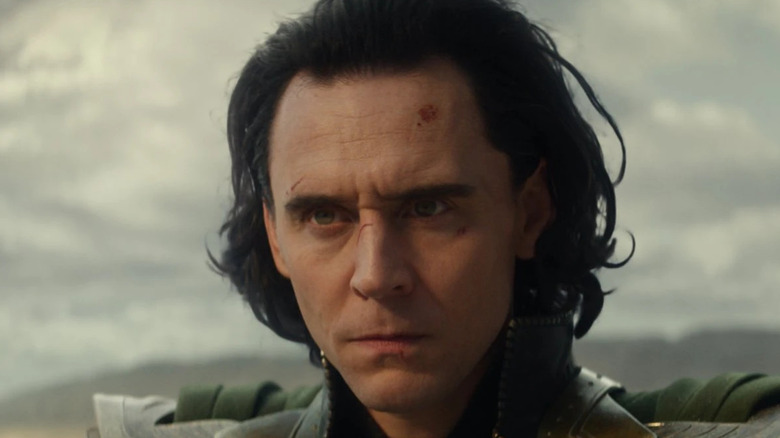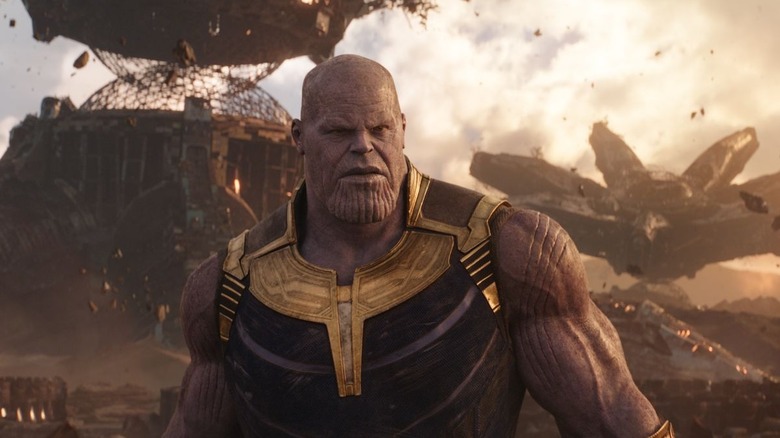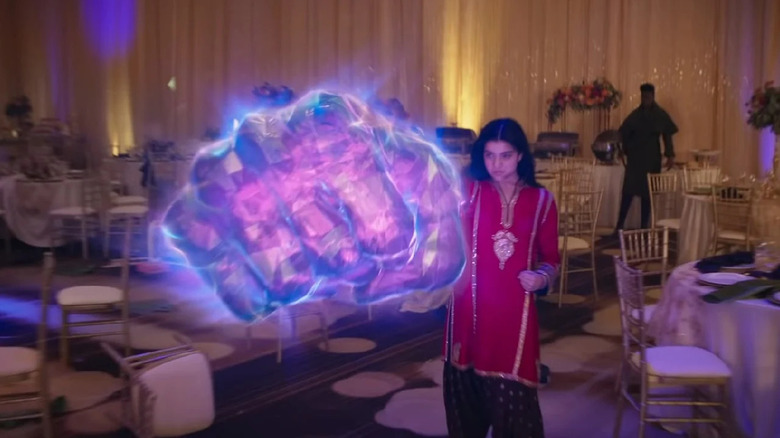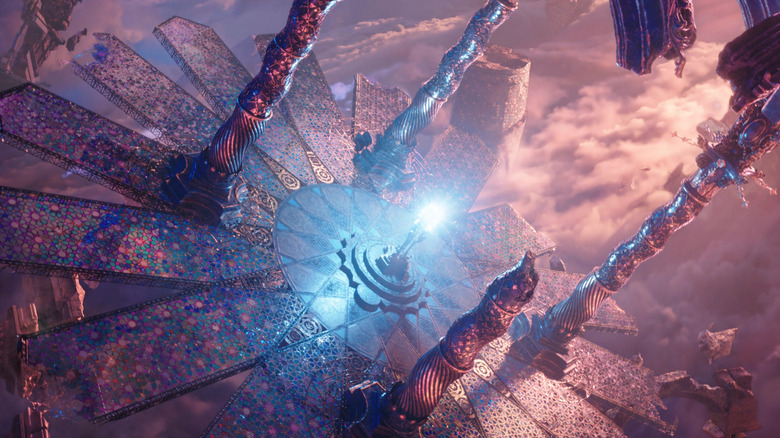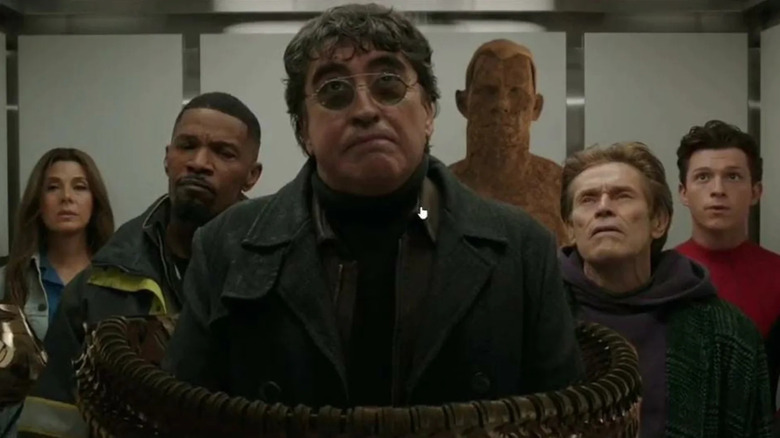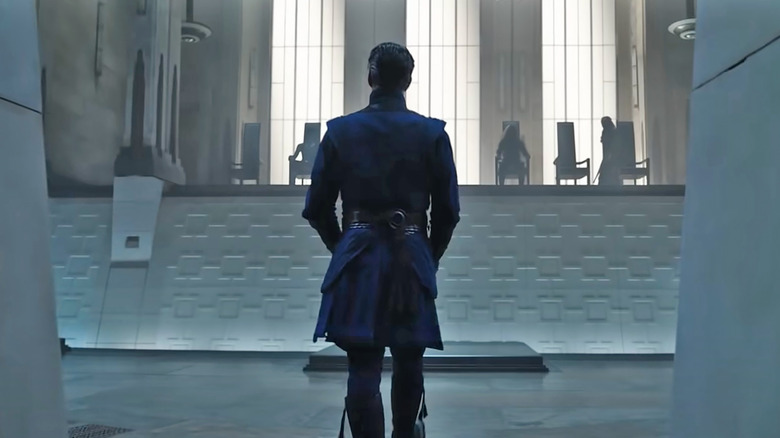The Big Problem In The MCU That Nobody Is Talking About
The Marvel Cinematic Universe is a massive, exciting, and thoroughly entertaining place. It manages to juggle dozens of important characters located across the U.S., the globe, and the galaxy. It has an endless string of narratives, too, some of which are short and sweet, while others can span multiple phases of storytelling. Even when you peek behind the curtain, the revolving door of A-list actors, elite directors, and countless other behind-the-scenes elements speak to the testament of what Marvel and Disney have created over the years.
With all of that said, it's also perfectly justifiable to say that the MCU is a bit overwhelming at times. Ever since Nick Fury showed up in Tony Stark's living room way back in 2008 spouting some (at the time) nonsense about an Avengers Initiative, the MCU has only grown bigger with each passing year. Everything takes place in the same world, and all of the stories (or at least most of them) eventually tie together. Some of them resolve over time, but the vast majority of them just keep on keeping on.
There's no question that this makes for a fun universe filled with a diverse ecosystem of individuals, cultures, peoples, and personalities, all coexisting side by side. And yet, as the number of elements within the MCU continues to pile up (especially those unresolved plotlines and open-ended stories), it begs the question: has Kevin Fiege's brainchild officially shifted from complex to straight-up convoluted?
We've taken a long look back over the past four phases of Marvel glory and have come to a hard conclusion. Yes, the sheer number of unresolved stories at the moment has become a serious problem that the creators need to address as we race toward Phase Five and beyond.
The steady storytelling of the Infinity Saga
Before we unpack the currently convoluted conglomeration that is the MCU Phase Four, let's take a quick stroll through the past decade and a half and consider how we got here. It all started back in 2008 when "Iron Man" premiered, receiving the complete and utter admiration of audiences everywhere. This was the signal that the world was ready for the superhero era of cinema to enter a new phase — Phase One, to be precise.
That phase introduced the origin of all six OG Avengers as well as several other key characters, like Nick Fury, Thunderbolt Ross, and Loki. Phase Two moved everyone's stories forward, adding some key characters like the Guardians of the Galaxy, Falcon, and Ant-Man into the mix. The Third Phase reached a crescendo as civil war broke out. Spiderman, Dr. Strange, Captain Marvel, and Black Panther arrived on the scene, and Thanos sparked an all-out war for the fate of the universe. Throughout these three phases, there were a lot of details to keep track of. And yet, there was a steady simplicity throughout the proceedings. Everyone and everything was marching toward the Mad Titan and the Infinity Stones. Were there some loose ends along the way? Sure. Mordo was left hanging at the end of "Dr. Strange" (and still didn't get his due in the sequel, by the way). Mac Gargan dropped into the "Spider-Man" franchise but still hasn't materialized into Scorpion. The Leader was introduced in "The Incredible Hulk" and then fell off the face of the planet (until news broke that he'd be in Captain America 4 — at least some of these dropped stories can still be salvaged). Regardless, anyone who cared about the story through Phase 3 could follow without too much trouble.
Phase Four has been a little bit of a hot mess
Alright, before you start throwing full wine bottles at your computer screens (and yes, that's a Strong Bad reference), we're not saying the current phase of the MCU is a dumpster fire or even that its individual installments are bad. Production-wise, Fiege and company have got their formula down pat, and they continue to churn out consistently fun, top-notch entertainment at every turn.
The problem comes from the complicated web of narratives they've created in such a short time. Phase Three technically ended with "Spider-Man: Far From Home" in the summer of 2019. In the three years following that point, we got well over a dozen movies, series, and TV specials. Many of these introduced a myriad of new stories, characters, places, and iterations. What's more, since we're in the early stages of the "Multiverse Saga" (as compared to the recently completed Infinity Saga), the majority of these new stories are still wide open and clearly collectively heading somewhere.
The question is, where? There's so much going on; it's hard to keep track of where everything is going anymore. We know there are more Guardians to come, but after seeing them in Thor 4 and again in a Christmas special (not to mention a nonsensical yet adorable Groot series of shorts), how are we supposed to remember where we left things with the intrepid crew after "Endgame?" What about Hulk? He's in "She-Hulk," which is fun for that story ... but also has a son now and is headed back to space. Oh, and the Eternals? Yeah, there are a lot of them, but does anyone even remember their names or that three of them were taken by the Celestial Arishem at the end of the movie?
The prime culprits causing the chaos
So, what is it that is making the MCU such a muddled mess at the moment? Why are so many storylines piling up and making it hard for anyone but the most diehard Marvelites to keep track of everything? There are a few candidates that could be causing the chaos, starting with the elephant in the room: the multiverse.
In "Avengers: Endgame," Professor Hulk deftly explains what time travel looks like in the MCU. The description ignores scientific debates and cuts to the chase with ruthless efficiency. Time travel works like this in the MCU. If you don't like it, too bad. Since that blessedly simple point in time, the concept of time travel and the multiverse that it brought with it have ballooned to become the central elements of the ongoing story (the entire saga is named after the multiverse, for goodness' sake). This opens up a literally infinite number of doors for creative storytelling. It also makes it really hard for casual viewers to remember what versions and iterations of a character or a story they're seeing at any given moment. Comic book connoisseurs may be used to the multiverse life, but the vast majority of MCU fans are still trying to make the adjustment.
Multiverse woes aside, Phase 4 has also been defined by a distinct tug-of-war between the past and the future. Movies like "Black Widow" and shows like "Wandavision" brought important revelations and moments of closure that carry directly over from the Infinity Saga. At the same time, the creators have been building new stories and introducing fresh faces at a tremendous clip.
Muddling morals, aggressive over-expansion, and too many crossovers
On top of the multiverse and past/future issues, the fourth phase of the MCU has steered heavily into the anti-hero concept. To be fair, this has already been present for a while now, but Phase Four has turned things up a notch. Prominent examples that come to mind include the redemptive nature of Abomination, along with nearly all of Spidey's villains. On the flip side, we have Moon Knight's very dark brand of hero antics. These are realistic and a fun way to shake up the script. But they also have the unfortunate side effect of adding to the overall confusion as audiences try to keep track of who's on what side at various times and in different stories.
In addition, as the Infinity Saga built momentum and worked toward its mighty conclusion, everything got bigger. Rather than pull things back and regroup, Marvel Studios has charged right ahead with this storytelling freight train in Phase Four, setting up stories at a marvelous rate that is, once again, making it hard to keep up. The sheer number of members in the Eternals team is a perfect example of the barrage of people being thrown into the MCU melting pot all at once — but it doesn't stop with individual characters.
The Infinity Saga was defined by two primary teams: the Avengers and the Guardians of the Galaxy. In comparison, Phase 4 and beyond is already busy setting up a new set of Avengers (or more than one), the Thunderbolts, a team of Marvels, the Illuminati, the Fantastic Four, the Defenders — the list goes on. When you have more alliances than there were characters in the original MCU superhero team, it's no wonder it's hard to keep everything in order.
Confusing crossovers, rapid-fire releases, and fickle fan service
But wait, there's more. The list of things contributing to the MCU's overwhelming Phase Four open-story policy is also exacerbated by the sheer number of crossovers taking place across the sprawling cinematic universe. Bruce Banner in "She-Hulk" and the GotG gang in "Thor 4" are obvious examples. But things get more nuanced. For instance, the "What If...?" animated Disney+ series has also been connected to the MCU as an active contributor to the story simply presented in another medium.
This makes for some fun scenes (read: Captain Carter in "Dr. Strange 2"), but once again, it adds to the over-complexity. The random and rampant fan service that has dominated Phase Four is yet another concerning issue. We like fan-casting John Krasinski as Reed Richards as much as the next guy, but is that the face of the character in the MCU now, or is it a one-off event? If it's the latter, it's yet another open-ended instance audiences will need to keep track of.
All of these more nuanced in-story arguments don't even touch on the already-mentioned rapid-fire release dates (especially coming out of the pandemic). While the endless procession of Marvel content is amazing on an entertainment level, it makes it much harder to keep up, rewatch, take in the details, and generally process everything that's going on.
The MCU is about as impressive a cinematic achievement as we've ever seen. And yet, the issue of too many open-ended stories is very real and shows no sign of slowing down or being resolved any time soon. If Marvel Studios wants to continue to work its magic for the foreseeable future, it's going to require some serious story resolutions soon before they start to lose the less committed in droves.
